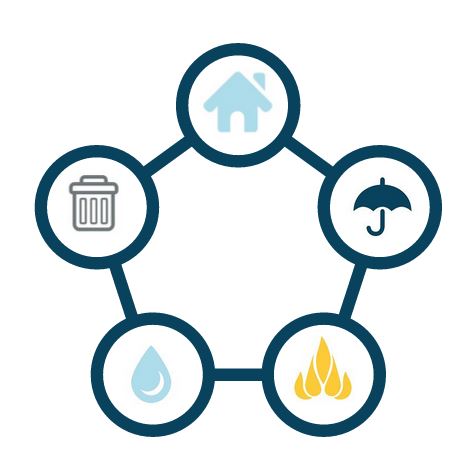Best Paying Jobs In Public Utilities – All You Need To Know!

The public utilities sector encompasses essential services such as water, electricity, natural gas, and waste management. Within this sector, certain jobs offer competitive salaries, attracting professionals with specialized skills and expertise.
The best paying jobs in public utilities typically include roles such as Utilities Manager/Director, Electrical Engineer, Civil Engineer (Water/Wastewater), Environmental Engineer, Regulatory Affairs Manager, and Operations Manager.
In this article, we’ll explore some of the best-paying jobs in public utilities, shedding light on their responsibilities, salary potential, and job outlook.
Utilities Manager/Director:
Utilities managers or directors are in charge of making sure public utilities run smoothly and safely. They plan strategies, manage budgets, and supervise staff members. Their job is crucial for keeping utility services reliable and effective.
The pay for utility managers can be different depending on factors like how big the utility is and where it’s located. But generally, they earn some of the highest salaries in the sector because their role comes with a lot of responsibility and requires a lot of expertise.
Electrical Engineer:

Electrical engineers who work in public utilities create and take care of electrical systems that make power, distribute it, and send it where it’s needed.
They focus on projects that involve renewable energy, making the power grid better, and updating infrastructure. Because their job needs special skills, electrical engineers usually earn good salaries.
They’re crucial for making sure electricity gets to people’s homes and businesses reliably and works efficiently.
Civil Engineer (Water/Wastewater):
Civil engineers who focus on water and wastewater infrastructure are responsible for designing, building, and taking care of important structures like water treatment plants, pipelines, and sewage systems.
Their job is crucial for making sure people have clean water to drink and proper sanitation. These engineers can earn good salaries, especially in places where there’s a lot of need for water projects. Their work helps keep communities healthy and protects the environment.
Environmental Engineer:
Environmental engineers help reduce the harm to nature caused by utility work. They tackle tasks like managing waste, controlling pollution, and making sure utility companies follow environmental rules.
Because companies want to be more eco-friendly, there’s a big need for skilled environmental engineers. That’s why experienced ones can earn good pay.
Regulatory Affairs Manager:

Regulatory affairs managers make sure that public utilities follow government rules and industry guidelines.
They handle getting permits, licenses, and approvals for utility projects. These managers are important because they help utilities understand and follow complicated rules.
They make sure utilities act legally and fairly. Their knowledge is important, and they can earn good money because they help utilities follow the rules and avoid problems with regulators.
Operations Manager (Power/Water/Gas):
Operations managers are in charge of making sure utility facilities run smoothly every day. They handle things like maintenance and fixing problems that come up.
They also work on making processes better, managing the things needed, and making sure everything follows safety rules.
In the utilities sector, operations managers can earn good pay, especially if they supervise big operations. Their job is important because they lead the way in keeping utility services dependable and working well.
Education And Experience Requirements For High-Paying Jobs In Public Utilities:
For lucrative positions in public utilities such as utilities manager, electrical engineer, and regulatory affairs manager, the necessary education and experience may vary. However, there are common qualifications sought after in these roles:
1. Educational Background:
Most high-paying jobs in public utilities mandate a minimum of a bachelor’s degree in a relevant field. Common programs include:
- Engineering (electrical, civil, environmental, etc.)
- Environmental science or environmental engineering
- Business administration or management (for managerial roles)
- Law or public policy (for regulatory affairs positions)
In some cases, advanced degrees such as master’s or doctoral degrees may be preferred, especially for specialized or research-oriented positions.
2. Technical Proficiency:

- Proficiency in technical skills is crucial for success in public utilities roles:
- Electrical engineers should demonstrate a strong comprehension of electrical systems, power generation, and distribution.
- Civil engineers specializing in water or wastewater infrastructure need expertise in hydraulics, environmental engineering, and construction management.
- Environmental engineers require knowledge of environmental regulations, pollution control technologies, and environmental impact assessments.
3. Work Experience:
- Relevant work experience is often a prerequisite for high-paying jobs in public utilities:
- Entry-level positions may require internships, co-op programs, or entry-level roles to gain practical experience and industry insight.
- Mid- to senior-level positions typically necessitate several years of experience in a related role, showcasing progressive responsibilities and leadership qualities.
4. Professional Certifications:
- Certain certifications can bolster candidacy for roles in the public utilities sector:
- Professional Engineer (PE) license for engineers, validating proficiency and competency in a specific engineering discipline.
- Project Management Professional (PMP) certification for managers, indicating expertise in project management principles and practices.
- Regulatory affairs certifications for professionals engaged in regulatory compliance and government affairs roles.
5. Soft Skills:
- In addition to technical qualifications, employers often seek candidates with strong interpersonal and communication skills.
- Leadership, problem-solving, and decision-making abilities are highly valued, particularly for managerial and supervisory positions.
- Collaboration, adaptability, and attention to detail are also essential for thriving in the dynamic and complex landscape of public utilities.
Comparing The Job Outlook For Public Utilities To Other Industries – Explore Career Opportunities!
1. Assessing Employment Prospects In Public Utilities Versus Other Sectors
The job outlook for public utilities can be compared to other industries by evaluating factors such as employment growth projections, demand for skilled professionals, and the impact of technological advancements and regulatory changes.
- Steady Demand: Public utilities typically experience steady demand for skilled professionals due to the essential nature of their services.
- Infrastructure Investments: Governments and private companies often invest in upgrading utility infrastructure, creating job opportunities for engineers and technicians.
- Technological Advancements: Adoption of automation and data analytics affects job roles, creating opportunities for professionals with expertise in emerging technologies.
- Environmental Concerns: Increasing pressure to reduce environmental impacts leads to demand for environmental engineers and sustainability specialists.
- Regulatory Changes: Evolving regulations impact staffing levels and skill requirements within utility companies.
- Competition from Other Industries: Public utilities face competition for talent from industries offering competitive salaries and career development opportunities.
What Are Public Utilities?

Public utilities are important services that everyone needs, like water, electricity, gas, and waste management. These services help us live comfortably and keep our communities running smoothly.
1. Water Supply:
Water utilities make sure we have clean and safe water to drink and use in our homes. They treat and deliver water to us through pipes and reservoirs.
2. Electricity:
Electricity utilities provide the power we need for lights, heating, and using our devices. They generate electricity and send it to our homes and businesses through power lines.
3. Natural Gas:
Natural gas utilities give us gas for cooking, heating, and other uses. They collect, process, and deliver natural gas to our homes and buildings.
4. Waste Management:
Waste management utilities take care of our trash, recycling, and sewage. They collect our garbage, treat wastewater, and manage landfills.
5. Public vs. Private Utilities:
Public utilities can be owned by the government or private companies. Public ones are often run by the government, while private ones are businesses. Both types follow rules to make sure they provide good service.
Frequently Asked Questions:
1. What are the typical work environments for professionals in the public utilities sector?
Professionals in the public utilities sector may work in various environments, including offices, field sites, laboratories, and manufacturing facilities. Depending on their roles, they may spend time conducting site visits, overseeing construction projects, or working in control rooms to monitor utility operations.
2. What skills are essential for success in high-paying jobs in public utilities?
Key skills for success in the public utilities sector include technical expertise in areas such as engineering, environmental science, or regulatory compliance. Additionally, strong analytical, problem-solving, communication, and leadership skills are valuable for navigating the complex challenges and responsibilities associated with these roles.
3. How do salaries in the public utilities sector compare to other industries?
Salaries in the public utilities sector can vary depending on factors such as job role, location, and level of experience. Overall, the sector offers competitive salaries, particularly for positions requiring specialized skills and expertise. While salaries may not always match those in industries such as finance or technology, public utilities jobs often provide stability and opportunities for meaningful work.
Conclusion:
In conclusion, the public utilities sector offers a range of high-paying jobs for professionals with the right skills and expertise. From utilities managers to electrical engineers to regulatory affairs managers, these roles play a vital role in ensuring the reliable delivery of essential services to communities.
With opportunities for career advancement and a steady job outlook, the public utilities sector continues to attract talented individuals looking for rewarding and well-compensated careers.
Read More:






